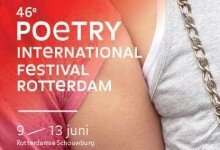Che Qianzi (1963) was born in Suzhou, Jiangsu Province, moved to Beijing in 1998, and began publishing poetry twenty years ago. He is consistent: his work appears with great regularity, both in official publications and – equally, if not more, important in China – unofficial ones. He is also inconsistent: his oeuvre is multiform, contradictory, unpredictable. Change is his goal, and critics have a hard time pinning him down. In their bewilderment they have to resort to a time-worn stop-gap: he and some kindred spirits tend to be labelled as ‘alternative’, a cliché in literary journalese ranking in frequency only just below ‘new’ .
There was a time when Che Qianzi, along with other poets, such as Zhou Yaping, advertised himself as a ‘Language Poet’, with a special interest in the nature of Chinese characters. He displayed no further activism on China’s turbulent poetic scene. His first appearance abroad took place during the Cambridge Conference of Contemporary Poetry in 2002.
Simply labelling Che Qianzi as a whimsical poet – as well as a painter and a calligrapher – would not be doing him justice. His whimsicality expresses itself time and again – consistency after all! – in the abruptness of his associations (‘the walnut is a school’), his mixing the abstract and the concrete (‘we have stolen the forbidden’) and in disparate registers of the Chinese language (‘some cover up is searching for the things in its category’). His poetry can be nonsensical, and breathtaking. Che Qianzi’s style is light-footed, but also tenacious and capable of generating a dream-like, unique experience. The linguistic nature of his enterprise – its restrictions and its power – is obvious. Thus he disarms the threat of a tiger hunting a child in the subsequent image: a child with a tiger on a leash. To Che Qianzi, poetry is a game, demanding the seriousness and dedication concomitant to playing a game: ‘my tongue is learned’.
[Che Qianzi took part in the Poetry International Festival Rotterdam 2003. This text was written on that occasion.]







